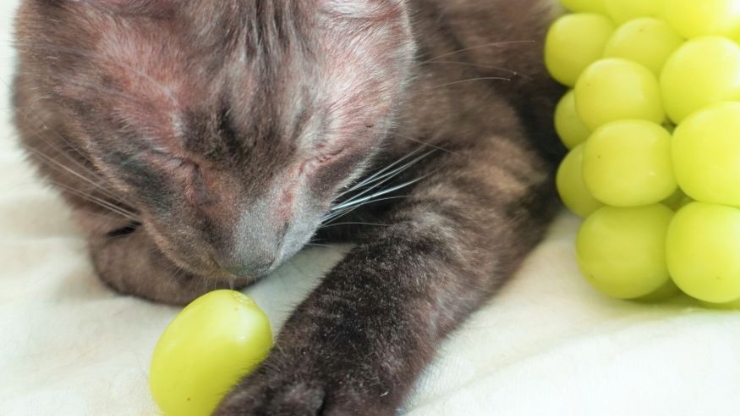You probably know that chocolate is dangerous for cats. You may have heard that onions, garlic, and other alums are bad for cats. But here are two seriously dangerous foods that fly under the radar: Grapes and Raisins. These are not just potentially problematic, they seem to be toxic.

Are Raisins Bad For Cats?
Raisins are absolutely unsafe for cats to eat. According to toxicity reports, grapes, raisins, and Zante currants may be even more toxic to cats than chocolate. They are also toxic to dogs. As is often the case, there are more poisonings reported for dogs than for cats.
This doesn’t mean dogs are more susceptible (we don’t yet know) but only that dogs are more likely to indulge in grapes or raisins than cats.
Since raisins are dried grapes, it would be fair to say that any type of grape, no matter how treated, whether dried or fermented, is dangerous to pets.
Most of us probably do not have to worry about our cats getting into some grapes. It’s the last thing a cat would eat, usually. Raisins may look a bit like kibble, but a quick sniff and a taste test will probably dissuade most cats from eating any.
If you have one of those cats who is obsessed with everything edible (and sometimes inedible), and frequently tries to rob the pantry, then you must be very careful not to leave grapes or raisins in reach of your feline buddy!
Grapes and Raisin Ingestion is HIGHLY Toxic To Cats and Dogs
Although most reports of grape toxicity in cats are anecdotal, many veterinarians would consider a cat exposed to raisins or grapes an emergency! While not every dog and cat is affected, when they are affected, it can be very serious and even life-threatening.
Again, more dogs have been reported than cats. Following the ingestion of seemingly trivial amounts of grapes or raisins, some dogs have developed signs of acute renal failure. Clinical signs may develop 1 to 5 days after exposure. In cats, signs have developed as early as 1 to 3 hours. However, these reports appear to be anecdotal.
A study from 2022, seeking to determine the incidence of clinical signs and acute kidney injury in dogs and cats after ingesting grapes, followed all cases of grape ingestion in dogs and cats reported to the Dutch Poison Control Center between January 1, 2018 and December 31, 2018.
The study included ninety-five dogs and 13 cats known to have ingested grapes. Of these, 14 dogs and two cats developed clinical signs. None of the cats developed acute kidney injury but the clinical signs included vomiting, lethargy, diarrhea, anorexia, tremors, and restlessness.
All types of grapes and raisins are implicated and all types of preparations. Wine may also be a danger, as fermentation does not render grapes safe for pets.
Why Are Grapes and Raisins Toxic to Pets?
We don’t yet know why grapes and raisins are toxic to pets. Heavy metals and mycotoxins have been ruled out as culprits. Certain chemicals in grapes, like tannins, may be responsible for the toxic effects and lead to kidney damage. Which chemicals in grapes are dangerous to cats and dogs is unknown at this time.
It is also possible, but less likely, that pesticides or other toxins on the surface of grapes and raisins are the cause.
The clinical signs of grape toxicity in cats are similar to Lily toxicosis. All parts of the lilly plant are dangerous to cats and lilies in the ‘daylilly’ and ‘true lilly’ families are equally toxic. Dogs can get sick from lillies but unlike cats, they don’t develop renal failure. There probably is no link between lillies and raisins but the signs and symptoms are similar. Gastrointestinal symptoms develop into renal failure.
Possible Signs of Grape or Raisin Toxicity in Cats
- Vomiting
- Drooling
- Decreased activity
- Loss of appetite
- Increased urination
- Dehydration
Clinical signs include swollen kidneys and kidney pain. The gastrointestinal symptoms may reside before renal failure sets in.
Vomiting and drooling may be the first thing you notice if your cat has eaten grapes. Cats vomit frequently compared to humans but if a cat continually vomits more than three times within a few hours and shows other signs of illness such as no appetite or an inability to keep food down, this is always a serious sign of illness.
In other words, the initial signs of grape toxicity could mirror all sorts of gastrointestinal problems or other types of toxicity so always take these symptoms seriously.
It is important to try to determine any exposure to dangerous foods, plants, or medications your cat has had. If you think your cat ate grapes or raisins, be sure to tell your vet as this will change their immediate approach to caring for your cat.
If you KNOW your cat has eaten grapes or raisins, do NOT WAIT FOR SYMPTOMS. Take your cat to the nearest emergency veterinary clinic immediately.
What Is Grape Toxicity Treated In Cats?
If grape or other toxicity is suspected, your veterinarian will attempt to decontaminate your cat while providing supportive care such as fluids. This is why taking your cat to a vet as early as possible is important. If the grapes or raisins can be removed from the intestinal tract, the chances of acute toxicosis can be reduced.
Your vet may use activated charcoal medication to absorb any substances that remain in the digestive tract.
Blood work will be performed to check kidney values and then your cat will most likely be hospitalized for up to 48 hours while test results are gathered and continued supportive care is administered.
IV fluids will be given to help produce urine and help protect the kidneys from damage. Blood work will be repeated to see how things are going and make sure kidney damage has not occurred.
If there is no kidney damage after two or three days, your cat will probably be sent home with a clean bill of health. If kidney damage does occur, it could be life-threatening.
Grape or raisin toxicity is certainly a bigger concern for dog owners than for cats since cats are much pickier about what they eat and may not consider a grape or raisin to be food at all. But, don’t take unnecessary chances. Keep grapes and raisins away from cats, especially if your cat is a crazy chow-hound who likes to eat unusual foods.
This article is meant as nothing more than a general overview of the grape and raisin toxicity in cats. It should not be considered a substitute for professional veterinary advice. Please consult your veterinary professional should you have concerns or would like more detailed information on the dangers of grape or raisin ingestion in cats.
